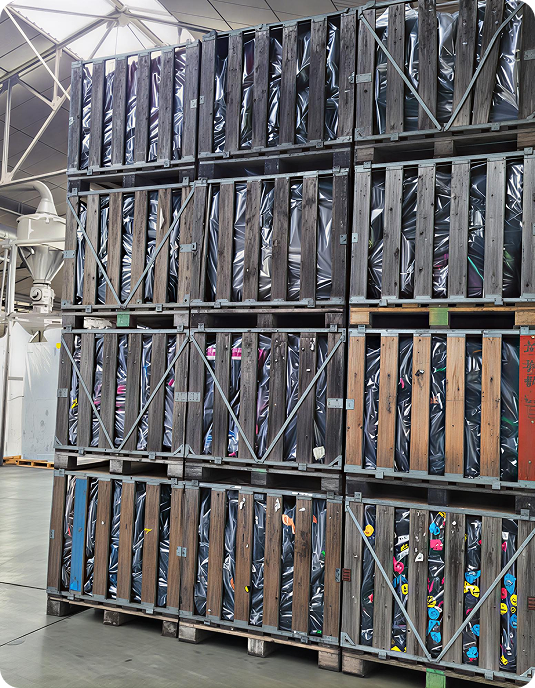Australia generates around 360,000 tonnes of soft plastic packaging each year, yet recovery remains below 5 percent.
When recycling systems fail, these materials are either exported, stored, or landfilled, costing millions in lost resources that could be reused.
Freight and processing costs continue to rise, while the burden of recycling is too often left with collectors alone.Without strong end-market demand, even the best recycling systems cannot succeed.
.png)
Close the Loop’s soft-plastics recovery framework centres on partnership and accountability, not one-way collection.We work with local government, brand owners, and industry on Circular Agreements, simple practical, measurable collaborations that ensure recovered material flows back into new products.Each partnership operates on a mass-balance model, where:
This approach keeps the system balanced, maintaining feedstock integrity, supporting local manufacturing, and delivering verified ESG outcomes.
.png)
Councils and industry partners collect and bale soft plastics for transport.
.png)
Materials are shredded, agglomerated, and compounded into recycled feedstock.
.png)
Recovered materials are used in:
.png)
Partners reinvest recycled content into new products or infrastructure, closing the loop.

Circularity only works when everyone plays their part.
When councils, brand owners, and recyclers share investment in freight, processing, and buy-back, the system becomes economically and environmentally sustainable.
This collaboration also builds resilience, reducing landfill dependency, stabilising local feedstock, and ensuring that what’s collected truly becomes something new.
Because nothing is genuinely recycled until someone chooses recycled content.

At the forefront of soft plastics recycling innovation in Australia
100% recycled content in all rFlex® products
1,500+ km of road paved using TonerPlas® (which includes recycled soft plastics)
Thousands of pallets of rFlex® polymer supplied to manufacturers
Multiple industry applications: furniture, packaging, construction, and infrastructure
Zero landfill policy for collected eligible soft plastics
Reduces soft plastic pollution and landfill reliance
Keeps plastic resources in use through closed-loop systems
Contributes to National Packaging Targets and ESG goals
Supports Net Zero and zero waste-to-landfill commitments



Stay current on Industry Updates & Circular Innovation
Does Close the Loop accept waste from households?

No, Close the Loop does not accept household waste and rubbish - that’s for your local government to handle.
Where do we receive soft plastics from?

Close the Loop accept soft plastics direct from councils as well as industry partners and retail store drop-off programs. We do not receive soft plastics direct from consumers, however we encourage the community to engage with their local councils to determine available recycling programs in their area, or check the Recycle Mate App.
Where do Close the Loop recycle soft plastics?

The updated Close the Loop facility in Melbourne recycles soft plastics, along with cosmetics and print consumables such as printer cartridges and toner bottles. This facility marks an important milestone in the expansion of Australia’s soft plastic recycling capacity, which is expected to play a pivotal role in supporting the relaunch of soft plastic collections around the nation during 2024.
The Soft Plastics Taskforce made up of major supermarket retailers welcomes the launch and the contribution it will make, and Close the Loop have committed to help the Taskforce process some of the stockpiled materials form the previous RedCycle program.
The Australian-designed, Australian-made recycling technology used to recycle soft plastics and create TonerPlas® and rFlex® will be duplicated into multiple locations around Australia, which means that greater volumes of local waste will be turned into high value local products using a local workforce. This model reduces the carbon impacts of freight while raising awareness in local communities.
Why does Close the Loop use recycled soft plastics to create TonerPlas®?

Technical Perspective: The polymers in mixed soft plastics are better suited for asphalt modification because they have a lower melting point and greater elasticity than conventional hard plastics.
Environmental Perspective: Flexible packaging is the fastest-growing packaging category, yet it has the lowest recycling rate. Soft plastics are not represented in the kerbside recycling stream, and approximately 450,000 tonnes are landfilled in Australia per year. TonerPlas® provides a key end market for these problematic materials and a high-value recycled content product until our use of complex soft plastics declines.
How many soft plastics does TonerPlas® use?

Every 1 km of road* paved with TonerPlas® modified asphalt uses approximately: